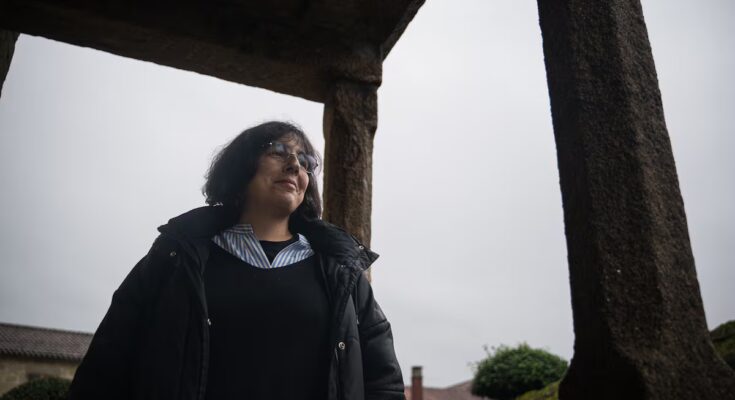María Varela’s time to think has multiplied since she became an oncology patient. In August he went to the mountains for a walk. His head began to wonder angrily why his turn had come. At 43, she was diagnosed with metastatic breast cancer. No health screening has detected this because in Galicia, as in much of Spain, these tests are not carried out until the woman turns 50. Mother of a seven-year-old child, the tumor initially plunged her into “absolute sadness”. Then the question that came back to haunt him changed: “I was wondering what had gone wrong with the system, what hole I had slipped into.” And then he felt the need to try to bridge that gap so that no one else would fall.
Varela has launched a campaign on Change.org to ask for breast cancer screening to be carried out starting at age 40 in order to detect tumors in increasingly younger women. He sees this trend around him, which is also perceived by doctors. So far, more than 53,500 supports have arrived in the form of signatures and a wave of “energy, affection and understanding”. “We must carry forward the projections. It is a popular cry, it can be seen in the environment”, defends this neighbor from A Baña (A Coruña) regarding a request that “is not against the PP or against the PSOE, it is health”, she underlines. “I invite the political leaders to go to the day hospital of the CHUS (Complexo Hospitalario Universitario de Santiago) at 12 in the morning. You will see that they have had to put chairs in the corridors so that we do not enter the waiting rooms. And there is everything there, not only elderly people, but also young women. It was my turn, but it could be anyone’s turn.”
All bodies consulted agree with Varela’s request to promote breast cancer screening, but with discrepancies in the age of onset. The Spanish Society of Medical Radiology supports the 40 year proposal. He argues that “technological advances and new scientific evidence generated in recent years” suggest this: “There is new evidence of a higher incidence at an earlier age and significant benefits for the age group of women between 40 and 50, with a reduction in 10-year mortality thanks to screening”. New technologies, adds this scientific society, also allow the radiation dose to be reduced and at the same time to increase the precision of the diagnosis.
The Spanish Breast Cancer Federation (Fecma), which represents 45,300 women affected by this pathology, recommends compliance with the latest recommendation of the Council of the European Union and the indication of the starting age of screening at 45 years. “There is currently no scientific basis for lowering it to 40 years,” explains its president, Antonia Gimón.
Laura Canosa was 40 years old and had just become the mother of her third child when she was diagnosed with very aggressive breast cancer. It was last year, during a routine mammogram she got through her private insurance. “First you ask yourself what you did wrong. No one in my family has had cancer, I don’t smoke, I was a mother at 28, I breastfed my children and I’m not overweight. You come to the conclusion that when it’s your turn, it’s your turn. And our turn is to get younger and younger.”
The “sensation” that breast cancer affects increasingly younger women is repeated by Canosa, Varela, Gimón and even doctors, but in Spain there is no single state registry that can verify with data that it is a reality. This perception and this lack are highlighted by Dr. Marta Blanco, of the Spanish Association against Cancer. Regarding whether or not to bring forward the screening age to 40, Blanco explains that medicine “needs time to evaluate the balance between benefits and disadvantages” of the measure. Mammography, he argues, is not a harmless test, as it involves radiation and at certain ages, for example between 40 and 45, it can give too many false positives due to the configuration of the breast tissue. These false diagnoses cause anxiety in those affected, aggressive testing that ends up being unnecessary (for example, one or more biopsies), and even excessive treatment. The oncologist underlines that currently the scientific evidence that screening reduces mortality is “strong” only if it covers a target population between 50 and 69 years old. If the range is lowered to 45 years, it remains “moderate”.
However, on the table of the Ministry of Health is the possibility of carrying out breast cancer screening from the age of 45 throughout Spain. Sources from Mónica García’s department confirm to this newspaper that, as required by law, this expansion of the age range (which would also reach 74 years) is already being examined by the Spanish Network of Agencies for the Evaluation of Health Technologies and SNS Benefits (RedETS). This body, which includes the health evaluation agencies of the autonomous communities, is the one that must determine “its safety, efficacy, effectiveness and cost-effectiveness”. The analyzed interval coincides with the latest recommendation of the European Council.
Varela wasn’t included in the breast cancer screening because she was under 50 and her diagnosis also took too long, she says. Last December he started having back pain. His condition worsened to the point that his family doctor asked him for some films in April. It took two weeks to do them and the Servizo Galego de Saúde (Sergas) did not inform him of the results until he ended up in the emergency room at the end of May because he could no longer even walk. He remembers that they admitted to him that no radiologist had seen that exam they had performed a month earlier: the image had been subjected to AI analysis and no alarm had been raised. There in the emergency room they examined her carefully and ruled out low back pain. What she had was metastatic breast cancer.
The goal of her campaign now is to prevent others from suffering the pain she and her family have suffered and are suffering. Varela argues that extending screening to women turning 40 would save millions in public health treatments. Just one pack of one of the eight pills he takes every day costs around 3,000 euros. “It is more preventative than curative medicine,” says Canosa. The tumor was diagnosed in private healthcare, but it was public healthcare that took charge of her complex treatments.
From the age of 45 in some communities
SV
In Spain, the Breast Cancer Early Detection Program establishes as a general recommendation that mammography be performed every two years on women between the ages of 50 and 69. There are communities that have chosen to broaden this age range both above and below and tests are even brought forward in some cases (if there is a family history, for example). Navarra offers them from the age of 45, as is the case in Castilla y León, Castilla-La Mancha, Valencian Community, La Rioja, Ceuta and Melilla. In the case of Murcia, the age is 47 years and older. Medical studies reveal that the screening program in Spain has reduced mortality due to breast cancer, which mostly affects women, by between 20% and 40%.


